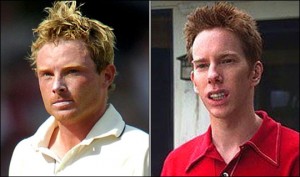
A gradual but inevitable descent into cricket-based loathing and bile.
Mark Nicholas Writes! Ashes Reviews Part One: England
Editor Steve writes:
Being the editor of a moderately unsuccessful cricket website is a challenging job. As well as the actual business of the articles themselves – and if you think they’re bad you should see the hundreds of ideas that I reject – there’s a never-ending cycle of grinding admin. Whether it’s speaking to the 51allout solicitor about various restraining orders, interviewing for new work experience boys or trying to negotiate payoffs around outstanding HR issues, it never stops. I sleep two or three hours a night. There’s no sex and drugs for Editor Steve. Do you know what I do? I find lost luggage. I locate mandolin strings in the middle of Austin.
Luckily I was brought up on the mean streets of Southampton, where the challenges of everyday life far outweigh even those of editing 51allout. During my time on the street, back in the late 80s, I befriended a local man who stopped to put a crisp ten pound note into my bedraggled hat. We chatted for several minutes, discovering a shared passion for cricket, amongst many other things. The next day the man stopped again, this time with the crispest twenty pound note I had ever seen. From then on we spoke every single day.
Eventually I learned that the man who would eventually become one of my firmest friends was none other than cricketer Mark Nicholas. Fast-forward more than 20 years and thoughts turned to asking the great man to contribute to our small, humble website. He was, of course, happy to contribute – he always is – but legal difficulties stood in our way. After more than two years of negotiations – another thankless task for yours truly – we finally reached agreement with those good people at ESPN Cricinfo, Channel 5, the Advanced Hair Studio and Channel Nine to allow Mark to contribute to our grateful site. So here he, is: cricketer, broadcaster, visionary, friend; Mark Nicholas:
Mark Charles Jefford Nicholas writes:
In my many years involved with cricket, I’ve never failed to be amazed by the sheer breadth of the game’s grip. From the southern shores of Tanzania to the base of the Himalayas, one is never far from someone with whom one can share a memory from the great game’s past. Be it Botham’s Ashes, the trickle, torrent and then flood of wickets on that final day in Adelaide back in 2006 or Ian Bell as King Canute, forcing back the tide of great Australian fast bowlers to lead England to a crushing victory at Lord’s, the Ashes is the height of that monument to history, the surviving Pyramids of Giza above the six other wonders of the game confined to the pages of antiquity.
Sadly, this series failed to truly scale the glorious heights of Ashes past, more Andean perhaps, than Himalayan. This says more about the gladiators themselves than the auditorium in which they fought; Australia are a scrappy young teenager of a side, yet to mature into adulthood where they will learn to choose their battles more wisely, picking their moment to go hard rather than lashing out under pressure (and/or the effects of alcohol, eh Mr Warner?). England, meanwhile, are far from the finished article but were stronger, wiser, more in control of their emotions from day one.
That’s not to say that the series victory came without suffering a few wounds along the way; few do. James Anderson was their Icarus, dangerously close to falling into the sea after flying so close to the sun in the first two matches. Alongside him Stuart Broad yet again showed that while he may never be a great wicket-taker, he will always be a taker of great wickets. And Matthew Prior had his most disappointing series in England colours, the driving force at the base of the middle order stalling like the charge of the Light Brigade, the umpires whisking away his chance for redemption with the winning runs at The Oval. He will do worse than remember that Lord Raglan was promoted from General to Field Marshal following the Battle of Inkerman, just a few months after that ill-fated ‘charge’.
Further up the order Joe Root and Jonny Bairstow both contributed little (Root’s crackerjack 180 aside) but learned much, as one always does in times of struggle (recall of course, that William Pitt the Younger became Prime Minister mere three years after losing the first general election he contested), while even Alastair Cook and Jonathan Trott failed to scale their usual heights, leaving England relying time and time again on the mercurial talents of Kevin Pietersen and the more dependable, but no less wonderful Ian Bell. While the former reaches for the stars in every innings, he only occasionally succeeds, here so with a masterful 113 in trying Manchester conditions to take England to safety, with a helping hand from the weather Gods. It remains a shame that those deities saw fit to secure the tiny urn with a gesture of indifference towards the game that ripped the fight from the Australians at their series peak.
Bell deserves special praise. With a face that looks as fresh now as it did when he was a rabbit in the glaring headlights of hyperbole back in 2005, he can often be mistaken for the junior partner in England’s experienced batting lineup. Nothing could be further from the truth. He is now a man, both a father off the pitch and a father figure on it. It represents the fulfilment of all that potential identified a decade back: Kipling’s most famous protagonist reincarnated with a blade of pure English willow. His is the Earth, at least that corner of which is England.
Another deserving of praise, albeit slightly more tempered, is Tim Bresnan. Hewn from the Yorkshire Dales themselves, his is a gift that few possess, namely that ability to never ever waver, as solid and as impressive as Malham Cove. Under pressure or carefree, Bresnan continues along the same path, providing the limestone pavement for Anderson, Broad and the perennially indefatigable Graeme Swann to flourish like spring blooms. Alas, Bresnan worked himself into the ground, his injury as unwelcome as it was undeserved.
In Bresnan’s absence, England took a rare opportunity to experiment in a dead rubber, if such a thing could ever exist in Ashes cricket. In came Chris Woakes and Simon Kerrigan for debuts that can be best described as mixed. Both are fine cricketers – Woakes in particular has all the talent to succeed anytime and anywhere – and surely come will that time and that place; yet all we learned here was that the step from domestic cricket to the international game is as vast as the Sahara – and as deadly – and so it should be. When they return both players will be more equipped to make that step up; to become men.
In truth this series often felt like a placeholder, with England destined to retain the Ashes from the very first day. All eyes are already on their tour of Australia, where there will be no margin for error. England have struggled historically in the whirling, noisy furnaces of the Gabba and the WACA and Australia will be ready, with jeers and beers and barracking steers. As of course, will all of us!




No Comments
Post a Comment